There are many people in the world who seem to agree that the correct reaction to impediments, setbacks, and personal affronts is a firm, unambiguous response. After all, how are people to understand that “its” and “it’s” are two different words if their homeworld is not immediately reduced to a lifeless cinder? But there are enough of us who prefer kinder, gentler responses that we form an audience for writers who give us protagonists who are kind… and still manage to prosper. Could the power of niceness possibly prevail in the real world? Perhaps not, but niceness makes for comforting reading.
Cycle of Fire by Hal Clement (1957)
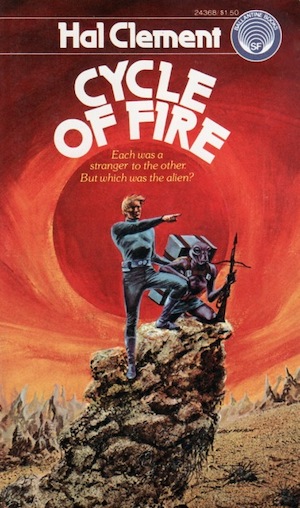
Marooned on a vast lava field, Dar Lang Ahn encounters a curious figure, human Nils Kruger. Nils too is a castaway, left for dead by his crewmates on alien Abyormen. This is the first time human and Abyormenite have ever met. Clearly the thing to do is to whip out their ray blasters to establish just who owns Abyormen!1 Except…this is a Hal Clement novel, and Clement believed the universe was enemy enough.
Rather than turning on each other, Abyormenite and human conclude that alone, both would perish. If they team up, they might survive the lava field and the challenges that lay beyond its borders. Thus, amicable relations between the two very different species are established. Which is all for the good, as Dar Lang Ahn’s people have some unexpected characteristics that could well provoke easily alarmed humanity into attacking them, had this diplomatic bridge not first been established.
***
“The Apprentice” (1960) by James White (from Monsters and Medics)
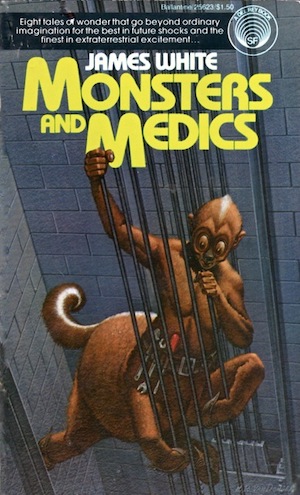
Arthur Nicholson is Coop’s Department Store’s long-suffering Personnel Manager. Extraterrestrial Harnrigg is one of the store’s latest hires. Young and enthusiastic, the centauroid’s exuberance outweighs his common sense. Many Personnel Managers in Nicholson’s place would simply fire Harnrigg the third or forth time Harnrigg landed in Nicholson’s office.
However, Harnrigg is not only Coop’s very first ET employee. Harnrigg is the very first alien visitor who is not a high-ranking functionary or brilliant academic. Well-meaning Harnrigg is an entirely unremarkable example of his kind…which means his employment at Coop’s is an experiment on which a disturbing number of eyes are focused. Can working-class aliens mix with working-class humans? Or must the two follow some policy of apartness? It is up to Nicholson to find some rewarding, productive niche for which Harnrigg is suited—peaceful galactic relations may depend on the insights of one middle manager.
***
Penric’s Demon by Lois McMaster Bujold (2015)
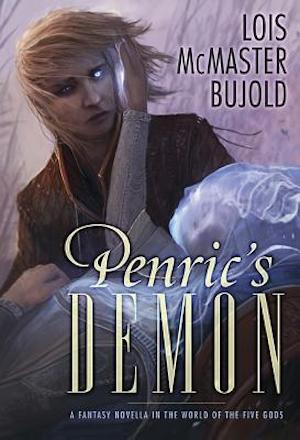
Demons are bad news. Sure, their magical gifts are powerful. Housed in the right brain, a demon is a useful tool. But ensconced in a weak-willed host, servant will become master. A seemingly human body could well have something infernal looking out of its eye sockets. Given the choice, it is best to steer clear of demons.
Amiable Penric has no choice in the matter. Stopping to assist an ailing old woman, he could only witness her death from natural causes, at which point the demon she hosted preserved itself by leaping into Penric’s body. There are many ways a human can try to bring a demon to heel to prevent the intruder from wearing Penric like an Edgar suit. Penric does the unthinkable: treating the entity sharing his body like a person with whom one can reason.
***
Kakuriyo: Bed & Breakfast for Spirits by Midori Yūma (2015)

Despite his more-than-dubious reputation, Aoi Tsubaki’s grandfather Shiro was her savior, rescuing the abandoned child after Aoi’s mother cast her aside. Aoi and Shira shared more than just blood. Both had the rare gift of being able to see the supernatural beings known as Ayakashi. It’s only once Shiro is dead and beyond rebuke that Aoi discovers that Shiro saw her as something even more precious than an adopted daughter. Shiro saw Aoi as collateral.
Kind-hearted Aoi offers a hungry Ayakashi food. Her reward? She’s kidnapped, carried off to the Ayakashi realm, and told that she has to pay off her grandfather’s hundred million yen debt to the Ayakashi lord Ōdanna. Ōdanna suggests that the debt could be discharged if Aoi were to marry him. Although this offer is better than the likely alternative—Ayakashi are rumoured to find human flesh quite delectable—Aoi proposes that she work off Shiro’s debt. But how can a human trapped in the Ayakashi world possibly earn a hundred million yen? No prudent Ayakashi would cross Ōdanna by hiring Aoi. The only solution: entrepreneurship and food even Ayakashi cannot refuse.
***
The Goblin Emperor by Katherine Addison (2014)
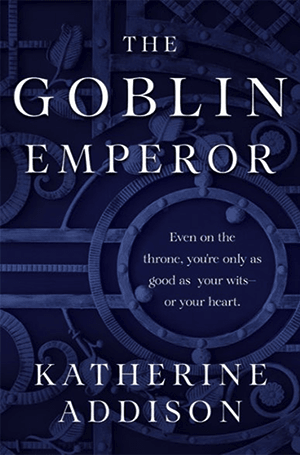
Obviously, no list of this sort could fail to mention Addison’s The Goblin Emperor. After all, its protagonist, newly minted emperor Maia Drazhar, who—having been subject to comprehensive abuse in the days when it was clear to all only the most unlikely of flukes would eliminate the emperor and all other heirs between Maia and the throne—refused to give in to the temptation to dole out comprehensive retribution when the most unlikely of flukes actually occurred.
Since The Goblin Emperor has appeared in various previous essays I’ve written, we don’t really need to cover it again here. Instead, a happy note for all the fans of the novel: in three short months, the sequel, The Witness for the Dead by Katherine Addison (2021), will appear. It focuses on Witness for the Dead Thara Celehar. One’s hopes that it will live up to the lofty standard of the original are greatly improved by the fact words such as “decency” and “fundamentally honest” figure prominently in the book’s description.
***
No doubt you read the above with increasing astonishment that I failed to mention some obvious candidate. Feel free to remind me of them in the comments below.
In the words of Wikipedia editor TexasAndroid, prolific book reviewer and perennial Darwin Award nominee James Davis Nicoll is of “questionable notability.” His work has appeared in Publishers Weekly and Romantic Times as well as on his own websites, James Nicoll Reviews and Young People Read Old SFF(where he is assisted by editor Karen Lofstrom and web person Adrienne L. Travis). He is a four-time finalist for the Best Fan Writer Hugo Award and is surprisingly flammable.
[1]For reasons that make sense at the time, Dar Lang Ahn spends part of the book under the mistaken impression that Nils is native to the region around the lava field, while Dar Lang Ahn is so unfamiliar with the local conditions Nils assumes the alien must be a visitor from another planet.










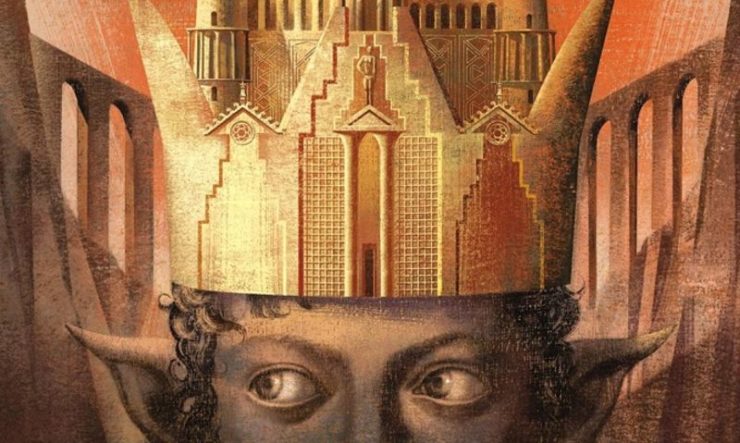
Wait, you mean we’re not supposed to do this? My English professor will certainly be surprised.
“Enemy Mine” comes to mind.
From this list, I have read only “The Goblin Emperor” (though the others sure sound worth checking out!). I was extremely happy to see Maia peeking out in the cover pic. This book is one of the most moving, high-impact things I have read in the last decade and I cannot recommend it enough (though unnecessarily, one would think, seeing how much love it (deservedly) receives all over).
I’m in the middle of rereading Ingathering, the collection of Zenna Henderson’s “People” stories.
I, too, believe this to be the only reasonable response.
I think Mirabile by Janet Kagan should get an honorable mention. The protagonist may be a bit crusty (with a heart of gold) to see the book as full of kindness, but she and others really do try to figure out solutions that work best for everyone. Except when the dandelions seeded cockroaches.
I agree with Joel Polowin @4–Zenna Henderson’s stories have lots of kindness, and the kind people do not get squished. I think a number of the other books on your 100 list could fit here, too: A Long Way to a Small, Angry Planet; Dreamsnake; Hellspark (as well as Mirabile, Tim @6); the wonderful A Door into Ocean and the Quaker books: Pennterra and The Dazzle of Day. SFF books for children often highlight kindness and power of loving connection: A Wrinkle in Time from your list, Diane Duane’s Young Wizards series, especially Deep Wizardry, also the delightful light fantasies by Eva Ibbotson.
Other first contact stories of kindness and positive connection: Elizabeth Moon’s Remnant Population and David Weber’s novella “A Beautiful Friendship.”
This category overlaps in my mind with the category of “nonviolent solutions to conflict,” as witness the Quaker books. A great story in that category is Edward Willet’s “Lost in Translation.” (Both this and “A Beautiful Friendship” are cases where I prefer the original to the later, expanded novel built on the story.)
Other than those, my main candidate for SFF where kindness wins is Patricia McKillip’s Od Magic. I hold that that novel is all about empathy: the positive sort of empathy which is understanding towards kindness.
@1, @5
They’re, their. Its all going to be ok..
David Gerrold’s Space Skimmer definitely has kindness winning out.
James White pretty much specialized in Kindness Wins stories. Whatever is at the opposite side of the spectrum from Grimdark was him.
@8: Cheque yourself before you wreck yourself.
Oh excellent – The Goblin Emperor is full of all the elements I usually really dislike in books I read. But I absolutely loved that book, so happy it was recommended to me. An imminent sequel is a great excuse to reread it.
An oldie but a goodie: A Martian Odyssey, by Stanley Weinbaum. First thing I thought of!
https://www.gutenberg.org/files/23731/23731-h/23731-h.htm
There’s a lot to be said for C.S. Lewis’s Out of the Silent Planet in this regard – Ransome’s learning the native language and customs of the aliens, contrasting with Weston’s nakedly colonialist attitudes.
@8: Oh, you wanna go there? Shall we talk about “hoard” and “horde”?
“Reign” and “rein”?
“Peak,” “peek,” or “pique”?
(I suppose that the real question is, where have all the copy editors gone?)
For “kindness wins,” the novels of “T. Kingfisher”… well, maybe not the Lovecraftian horror so much, although, if I have to experience Lovecraftian horror, at least let me experience it in the company of an Ursula Vernon heroine. But I was thinking of the Clocktaur/Paladin books, where the lead characters all exhibit that Vernon brand of practical kindness in the face of distress. And where there’s an entire religious order dedicated to practical kindness, or kind practicality.
Silk, the protagonist of The Book of the Short Sun, is one of those people who draws the best out of those around him by seeing them as being capable of virtue.
@8, @15:
Queue hostile reactions. Get you’re just deserts.
Agreeing with suggestions of Zenna Henderson and James White.
Oh, A Martian Odyssey. I haven’t reread that in years.
Also from T Kingfisher with a value on kindness, Minor Mage, Nine Goblins, and Castle Hangnail.
@15 Amaryllis–Copy editors? Who needs copy editors when we have spellcheck? Copy Editors Cost Money. The other day I was reading a novel from a very reputable publisher and found the word “phased” where the intended word was clearly “fazed.” Perhaps we should all convert to audiobooks?
Yes, T.Kingfisher/Ursula Vernon is a good suggestion. I was very happy to see the Nebula nomination for her A Wizard’s Guide to Defensive Baking, though somewhat surprised that it was nominated as a middle grade/YA book–her Wikipedia page groups it with her books for adults. But then, the Wikipedia page just has two categories, children and older audiences. All I can say is, it was one of the delights of my pandemic reading.
I’m currently reading Drew Hayes’ Fred the Vampire Accountant series which promotes friendship and honesty even when interacting with very scary parahumans.
I didn’t care for Goblin Emperor because the author’s thumb was all too clearly present making all the outcomes magically favor the kindness protagonist. However that is probably even more commonly abused on the opposite end of the spectrum where the violence protagonists rarely face realistic consequences.
@17: “Just desserts” is one of the tenants of my creed. Of vegetables, we do not speak.
@18 and 19: yes those are all excellent too.
@Saavik: No, I’d be even worse off with audio books. It would be “what did he say?” and mondegreens all over the place.
@8 wiredog
Thats just wrong.
It’s not obvious from the description how _Kakuriyo_ fits this list.
Becky Chambers’ “Wayfarers” books would be an obvious pick, but I think John M. Ford’s “The Final Reflection” would work, too. He doesn’t really convert the Klingons to peaceful pursuits, but the lead character does find ways to succeed by resorting to kind words and deeds…
Just a quick word of remembrance for some of the stories and novels by Clifford D. Simak, too!
As I’d sometimes like to firebomb my firm’s clients back into the Stone Age over their refusal to use the Oxford comma.
I was not surprised to see the cover illo for The Goblin Emperor peeking out at the top of this article. And, of course, pleased.
Not surprised to see James White in this list, although I admit to being underexposed to his work (a lack which I should correct). The one story of his (likely a Sector General one) I recall involves a dentist being confronted with the dental problems of an alien who doesn’t know Earth languages.
@26: The dentist story sounds like it could be one of the short stories that make up Prostho Plus, which is a fixup by Piers Anthony. I don’t remember any James White stories involving dentistry.
@24/sslemmons: I don’t remember the lead character as particularly kind, but perhaps that’s because Star Trek characters are generally kind, so it wouldn’t stand out.
Aren’t half of the world’s stories about kind people who still manage to prosper? For example, Ursula Le Guin and Hayao Miyazaki haven’t been mentioned yet.
@28:, stories about kind people — whatever their other qualities — who manage to prosper are indeed an old tradition. As Ogden Nash explains it:
@27/CKD, I don’t remember any Dentist stories in the Sector General series but it certainly sounds like the Sector General formula; Doctors trying to help a sick alien while totally uncertain about just what is normal for them.
James, thank you for this thoughtful and encouraging piece. Much needed right now.
I think there are some lovely moments of kindness in Malka Older’s Centenal Cycle (and a lot of moments of cruelty). Nnedi Okorafor’s Binti series has some beautiful depictions of friendship and loyalty. And Nancy Kress’s protagonists are often tenacious in their attempts to reach out and build common ground with the aliens (and humans) they encounter.
On the fantasy side, I just want to highlight Maurice Broaddus, A. Lee Martinez, and P. Djèlí Clark for some great portrayals of friendship and hope in the most terrifying circumstances.
Saavik @@@@@ 7
Other than those, my main candidate for SFF where kindness wins is Patricia McKillip’s Od Magic. I hold that that novel is all about empathy: the positive sort of empathy which is understanding towards kindness.
I think a number of Patricia McKillip’s novels would qualify.
PeterErwin @32: True that! McKillip came up on another Tor thread, about SFF books where violence is not the solution. As you say, lots of her books qualify for that list or for this. But Od Magic stands out to me as being *all about* kind empathy, as the real power that matters and prevails.
I would recommend the manga “My Next Life as a Villainess: All Routes Lead to Doom!”, Where the protagonist abruptly realizes she’s been reincarnated into her favorite romance game- as the villainess. And all she has to fight her inevitable doom is her basic kindness, empathy and decency. She has no inkling how switching from an arrogant privileged brat to a kind and loving person will affect the people around her..
@23, Aoi succeeds in her risky new restaurant business because she is kind to Ayakashi who turn out to be powerful (much like the youngest siblings in fairy tales). Also, if I remember correctly, her food is so delicious to the Ayakashi because of the kindness she imbues it with.
@34 My Next Life as a Villainesse is a lot of fun: very clever the way it plays with tropes (the plot keeps trying to squeeze her into a villainous corner, and she keeps sliding out of it in inventive ways).
Margaret Rogerson’s Sorcery of Thorns was mentioned in a post about Gothic in YA, specifically for how the heroine upends traditional exploitative ways of doing magic by befriending a demon (much like Penric). It’s also about supposed enemies learning to work together and eventually trusting each other.
Also, why has no one mentioned how kind Murderbot is? Totally against its will, but it just can’t help liking stupid humans. (And now I’m revisiting all the Murderbot stories to find that quote about how it’s hard to stop caring once you start.)
@29/Amaryllis: Or they saved animals who later turned out to be powerful and performed their impossible tasks for them out of gratitude.
@35/Kaippersbach: The only Murderbot story I read was Artificial Condition, and I was put off by the way the main character treated the helpful ship AI. It even gave it a derogatory nickname.
After conferring with Charlie Jane Anders on Instagram, I’ve started to refer to this genre as cozypunk. It seems inappropriate to call these ideals humanist since there are often aliens involved, but they all seem to share the philosophy that sentient beings will tend towards goodness if they have enough resources. Elizabeth Bear’s new White Space series are a great example, as are the Culture novels, Discworld, and anything by Charlie Jane, of course.
I particularly love Forthright’s Amaranthine books. They are full of love, empathy, kindness, and so on. They may only be available as ebooks on Amazon.
Thank you for this article. I don’t know if I’ll ever read the works mentioned, but it certainly raised my spirits!
@36 JanaJansen: The relationship between Murderbot and that ship becomes one of the crowning delights of the whole series! I realize most people would not immediately connect Murderbot with kindness, but the arc of the whole series is a being who has been treated like worse than dog poop for its entire existence gaining independence and deciding what to do with itself: it was designed as a killing machine, so it could certainly go on a rampage of vengeance against everyone who annoyed it (which is everyone!). But it chooses not to. And its choices keep leading it toward caring and trust, despite its trauma, and despite the universe being a particularly messed-up vision of what rampant capitalism could turn into.
@37 Sue: “sentient beings will tend towards goodness if they have enough resources.” Love this thought!
There is a great deal of kindness in the Myth, Inc. series started by Robert Asprin and continued by Jody Lynn Nye. Most of the antagonists eventually become friends thanks to Skeeve being willing to look for the circumstances that brought them to where they are.
@36 JanaJansen: In Network Effect when Murderbot finally meets ART’s crew, the crew comments that the nickname is quite appropriate. :-)
On the fantasy side, almost all of Ursula Vernon/T Kingfisher’s titles would apply! The first that came to mind was The Seventh Bride, though Raven and Reindeer would be a good fit too…and it’s a main element of her children’s book Castle Hangnail.
It’s a pretty solid element of Discworld at times too.
“the universe was enemy enough”
Amen! I have been spending time at /r/HFY lately, and much prefer the slice-of-life stories about making friends and improving your section of space. Instead of the 40K knockoffs that seem to be mostly hyper-competent armies stomping lesser opponents.
In recent work (and actual SF, not fantasy, for those with a preference that direction), Nathan Lowell’s Solar Clipper Trader’s Tales (starting with Quarter Share) fit solidly in this category.
Going back to my roots in SF, Heinlein’s The Rolling Stones seems to fit this as well. Even books like Tunnel in the Sky, which have significant physical conflict, don’t actually settle any of the important questions that way; the students who survive best do so by cooperating.
I might add the Strange Hiding Place trilogy to this list. An orphan encounters an alien that tells him he has part of a code written in his DNA and he, the alien, was sent to retrieve the boy and two others from different spots around the world to assemble the code to build the means to protect their homeworld from an incoming war, and it’s about the bond they have to build with each other under extraordinary conditions, they’re pretty good ^_^
“A Sufficiently Advanced Christmas” by Eric James Stone from A FANTASTIC HOLIDAY SEASON – Three idiosyncratic subprograms of a sleeping computer play Santa for a small boy far from home.
As much as I love LMB’s Penric’s Demon, for this particular thread, I would have gone with her Sharing Knife series.
Tangentially, although it’s been years since I’ve read the books, I remember a religious order from David Gemmell’s Drenai Saga that is devoted to “balancing the tide” by making sure every interaction they have with another is kinder and more generous than necessary in order to make up for how one negative interaction can lead to a cascade of negativity.
Ursula Vernon/T. Kingfisher has already been mentioned, but let me recommend in particular her webcomic Digger. There’s some violence, including violence done by Digger herself when she feels it’s necessary–but it’s not her default mode, and the plot is shaped in large and important ways (that I can’t describe without spoilers) by her basic decency, nearly all of the time, toward anyone who isn’t trying to mess with her and even some people who are (Ed!).
Note: Art style and Vernon’s subsequent career notwithstanding, parts of the comic are definitely Not For Kids. If she published it today, it would absolutely be under the Kingfisher name.
Well, for some definition of kindness (in that the ET – a human – doesn’t exterminate the native, in fact, helps him/it), even Clement’s “Mission of Gravity” would fit, too.
The Inner Life by Dorothy Heydt as Katherine Blake certainly fits here.
Any of the several series by M.C.A. Hogarth certainly fit here, as does _A Rational Arrangement_ by L. Rowyn.
How about Alexander Key’s The Forgotten Door? I read this when I was quite young, and had a copy for many years. It’s ET long before there was ET: Jon, an alien, accidentally falls through a portal and lands near a farm on Earth, where he’s befriended by a kind family, who eventually help him get back home despite the best efforts of others to capture or kill him. I loved this book, and am amazed to find that it’s still in print in electronic form on various devices (e.g., Kindle).
@27, @30
It probably is from Piers Anthony’s Prostho Plus. I was writing from memory, I think I encountered the story in an anthology or magazine.